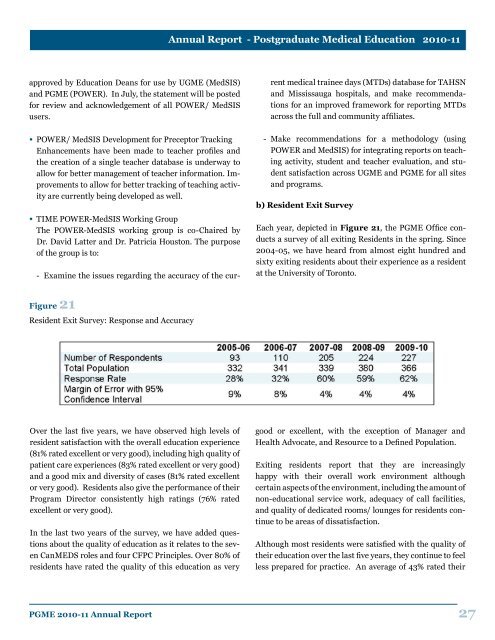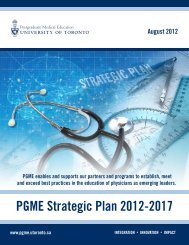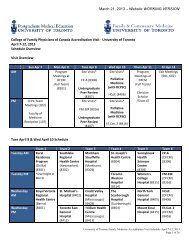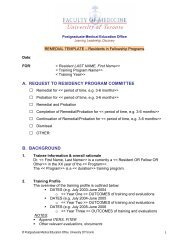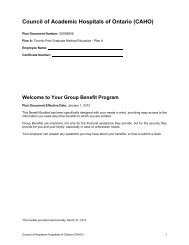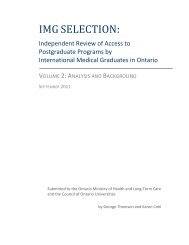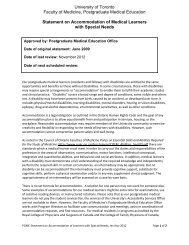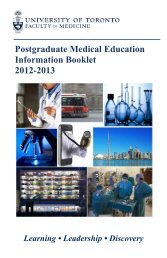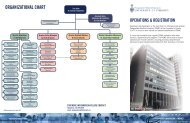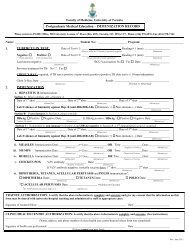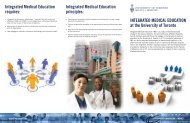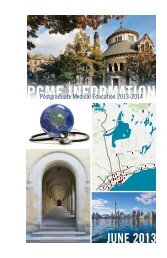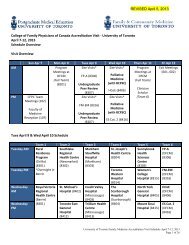PGME Annual Report 2011 - Post Graduate Medical Education ...
PGME Annual Report 2011 - Post Graduate Medical Education ...
PGME Annual Report 2011 - Post Graduate Medical Education ...
Create successful ePaper yourself
Turn your PDF publications into a flip-book with our unique Google optimized e-Paper software.
<strong>Annual</strong> <strong>Report</strong> - <strong>Post</strong>graduate <strong>Medical</strong> <strong>Education</strong> 2010-11<br />
approved by <strong>Education</strong> Deans for use by UGME (MedSIS)<br />
and <strong>PGME</strong> (POWER). In July, the statement will be posted<br />
for review and acknowledgement of all POWER/ MedSIS<br />
users.<br />
• POWER/ MedSIS Development for Preceptor Tracking<br />
Enhancements have been made to teacher profiles and<br />
the creation of a single teacher database is underway to<br />
allow for better management of teacher information. Improvements<br />
to allow for better tracking of teaching activity<br />
are currently being developed as well.<br />
• TIME POWER-MedSIS Working Group<br />
The POWER-MedSIS working group is co-Chaired by<br />
Dr. David Latter and Dr. Patricia Houston. The purpose<br />
of the group is to:<br />
- Examine the issues regarding the accuracy of the cur-<br />
rent medical trainee days (MTDs) database for TAHSN<br />
and Mississauga hospitals, and make recommendations<br />
for an improved framework for reporting MTDs<br />
across the full and community affiliates.<br />
- Make recommendations for a methodology (using<br />
POWER and MedSIS) for integrating reports on teaching<br />
activity, student and teacher evaluation, and student<br />
satisfaction across UGME and <strong>PGME</strong> for all sites<br />
and programs.<br />
b) Resident Exit Survey<br />
Each year, depicted in Figure 21, the <strong>PGME</strong> Office conducts<br />
a survey of all exiting Residents in the spring. Since<br />
2004-05, we have heard from almost eight hundred and<br />
sixty exiting residents about their experience as a resident<br />
at the University of Toronto.<br />
Figure 21<br />
Resident Exit Survey: Response and Accuracy<br />
Over the last five years, we have observed high levels of<br />
resident satisfaction with the overall education experience<br />
(81% rated excellent or very good), including high quality of<br />
patient care experiences (83% rated excellent or very good)<br />
and a good mix and diversity of cases (81% rated excellent<br />
or very good). Residents also give the performance of their<br />
Program Director consistently high ratings (76% rated<br />
excellent or very good).<br />
In the last two years of the survey, we have added questions<br />
about the quality of education as it relates to the seven<br />
CanMEDS roles and four CFPC Principles. Over 80% of<br />
residents have rated the quality of this education as very<br />
good or excellent, with the exception of Manager and<br />
Health Advocate, and Resource to a Defined Population.<br />
Exiting residents report that they are increasingly<br />
happy with their overall work environment although<br />
certain aspects of the environment, including the amount of<br />
non-educational service work, adequacy of call facilities,<br />
and quality of dedicated rooms/ lounges for residents continue<br />
to be areas of dissatisfaction.<br />
Although most residents were satisfied with the quality of<br />
their education over the last five years, they continue to feel<br />
less prepared for practice. An average of 43% rated their<br />
<strong>PGME</strong> 2010-11 <strong>Annual</strong> <strong>Report</strong><br />
27


